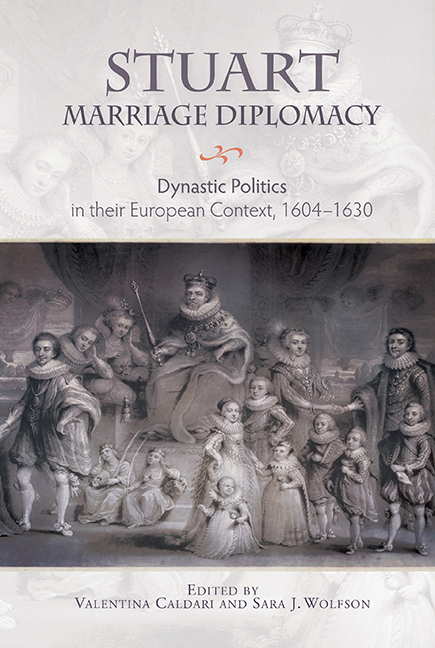Book contents
- Frontmatter
- Contents
- List of Illustrations
- List of Contributors
- Acknowledgements
- List of Abbreviations
- Introduction
- Part One Marriage and the Court
- Part Two Marriage and Politics
- Part Three Marriage and War
- 9 The Stuarts, the Palatinate and the Thirty Years’ War
- 10 Marital Problems? Stuart Alliances, Scottish Politics and the Protestant North, 1603–41
- 11 Recognizing Friends from Foes: Stuart Politics, English Military Networks and Alliances with Denmark and the Palatinate
- Part Four Marriage and News
- Part Five Marriage and Continental Europe
- Part Six Marriage and Ceremony
- Bibliography
- Index
- Studies in Early Modern Cultural, Political and Social History
10 - Marital Problems? Stuart Alliances, Scottish Politics and the Protestant North, 1603–41
from Part Three - Marriage and War
Published online by Cambridge University Press: 24 October 2019
- Frontmatter
- Contents
- List of Illustrations
- List of Contributors
- Acknowledgements
- List of Abbreviations
- Introduction
- Part One Marriage and the Court
- Part Two Marriage and Politics
- Part Three Marriage and War
- 9 The Stuarts, the Palatinate and the Thirty Years’ War
- 10 Marital Problems? Stuart Alliances, Scottish Politics and the Protestant North, 1603–41
- 11 Recognizing Friends from Foes: Stuart Politics, English Military Networks and Alliances with Denmark and the Palatinate
- Part Four Marriage and News
- Part Five Marriage and Continental Europe
- Part Six Marriage and Ceremony
- Bibliography
- Index
- Studies in Early Modern Cultural, Political and Social History
Summary
‘In the old Europe, a royal wedding was a diplomatic event of the first importance, and royal wedding festivities were a statement of policy.’
Historical discussions surrounding post-1603 Stuart diplomacy frequently place an emphasis on the role of dynastic marriage as the key factor in establishing early modern international alliances. Such nuptials could, if successful, bring kingdoms into closer alliance, or, if they failed, drive irreparable wedges between them. As regards the Jacobean and early Carolinian periods, discussions frequently focus on two key events. The first of these centres on the Spanish match, which failed to conclude a marriage between Prince Charles of Great Britain and Infanta Maria Anna of Spain in 1623 after a decade of sporadic negotiations. Attention then shifts to the subsequent marriage of Charles I to Henrietta-Maria of France in 1625, albeit a French union, too, had been mooted since 1616. These events notwithstanding, the marriage alliance, whether merely considered or actually consummated, was only one form of diplomacy undertaken in the period. Other alliances could and did evolve without any bedroom antics and, as we shall see, these concords could be more enduring than the courtly affairs that more easily draw the attention of the scholar.
In the British case, the full suite of options open to the House of Stuart are sometimes misunderstood by historians, who often fail to grasp the well-developed diplomatic policy of King James. Most studies fail to give requisite thought to the fact that existing marital alliances already fused the House of Stuart into the fabric of European coalitions long before James VI ascended the throne of England as James I. When James arrived in London he did so with a range of military and commercial obligations to his continental allies. Obviously, research into each of these existing Jacobean alliances is important if we are to understand the bigger picture of Stuart diplomacy as it straddled the incorporation of England and Ireland into the wider Stuart portfolio. This chapter therefore aims to contextualize the relationships between the Stuarts and the Catholic powers by placing them into the milieu of a broader understanding of extant Stuart alliances. It does so with an emphasis on Scotland and the northern European nations with which James had both overt and covert associations.
- Type
- Chapter
- Information
- Stuart Marriage DiplomacyDynastic Politics in their European Context, 1604–1630, pp. 157 - 172Publisher: Boydell & BrewerPrint publication year: 2018



